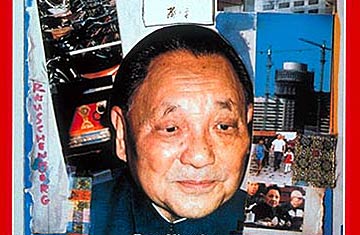
(6 of 17)
Private enterprise began as a kind of offshoot of the agricultural reforms. Mao's "people's communes," for all their faults, at least guaranteed everyone in the rural economy a job of sorts. Deng and his lieutenants feared that breaking up the communes would cause masses of jobless peasants to descend on the cities, where there might be no work for them either. So beginning in the late 1970s, individual farmers and village collectives were permitted to start sideline businesses and keep any profits.
The first enterprises were connected with farming: a group of peasants would set up a roadside market to sell their crops and perhaps buy a truck to haul their own produce as well as, for a fee, food grown by other peasants. But private entrepreneurs and village collectives have now expanded to all kinds of other businesses--inns, restaurants, stores, tailor shops, beauty parlors and light manufacturing like assembly of TV sets--often in competition with government-owned businesses. Some entrepreneurs have even opened services in major cities to recruit maids and other household help for busy urban families. Businessmen can hire workers privately, a practice that conventional Marxists regard as inherently exploitative. Legally, no private entrepreneur is supposed to employ more than 15 hired hands, but local Communist Party officials often ignore that limit.
However, private and collective enterprises, though they are growing rapidly, are still a relatively minor force. At last count, 10.6 million registered private businesses with sales of $8 billion employed 15 million workers, or 4.5% of China's nonfarm work force. Roughly 1.7 million collectives employ an additional 100 million workers; in several provinces they have become the dominant form of business. Nationwide, though, more than 85,000 state-owned enterprises account for a heavy majority of jobs and four-fifths of China's industrial output. Until very recently they operated under a system that Mao had copied from Stalin: ministries in Peking assigned all raw materials and dictated all investments, told every factory manager what and how much to produce and where to sell it and at what price, set wages and assigned jobs, took all profits and subsidized any losses. As late as 1984, one factory manager in Shanghai says, he had a discretionary fund of only $33 that he could spend without getting permission.
Early on, Deng's government began revising this system too. In 1979 it halted a Stalin-style Five-Year Plan that emphasized heavy industry, like steel mills, and redirected much investment into consumer goods: refrigerators, washing machines, TV sets. Some of the controls have been progressively loosened. In 1982 Peking stopped dictating all garment styles and freed the city's factories to adopt their own designs. Result: though perhaps 80% of any randomly assorted crowd are still dressed in baggy Mao suits, there is a generous sprinkling of blue jeans, Western-style business suits and coats, skirts and knee-high leather boots.
